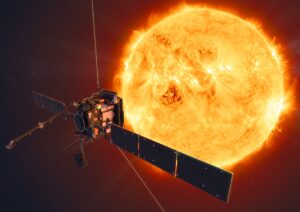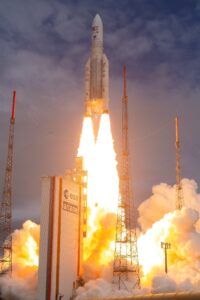Czech Republic marks 15 years of membership in the European Space Agency
On Monday 27 November 2023, a conference was held on the occasion of the 15th anniversary of the Czech Republic’s accession to the European Space Agency (ESA), organised by the Ministry of Transport. On the conference, the Ministry of Education, Youth and Sports (MEYS) was represented by Radka Wildová, Director General for Higher Education, Science and Research section. The Czech Republic became an ESA member state on 12 November 2008.
The Ministry of Education, Youth and Sports (MEYS) has been cooperating with the European Space Agency (ESA) since the mid-1990s, when it first negotiated the Framework Cooperation Agreement between the Czech Republic and ESA, ensured the implementation of the pre-entry cooperation of the Czech Republic as a European Cooperating State, and then, together with the Ministry of Transport, negotiated the accession of the Czech Republic to ESA.
The core of the cooperation between the MEYS and ESA is the support of research and development (R&D) programmes, to which the MEYS contributes around EUR 14.2 million per year (i.e. approximately CZK 360 million) to mandatory activities, which is mainly the Scientific Programme, and other optional programmes, in particular the PRODEX programme for the development of scientific instruments. Thanks to this support, Czech research organisations and companies are involved in the most important scientific missions carried out in pan-European cooperation.
Artist’s impression of the Solar Orbiter credit: ESA/ATG medialab; Parker Solar Probe: NASA/Johns Hopkins APL
Particularly significant is the Czech participation in the Solar Orbiter mission, launched in February 2020, in which Czech research organisations and companies participated in 5 projects on 4 scientific instruments, other Czech companies realised contracts directly for the construction of the spacecraft itself, and JUICE, i.e. the probe to Jupiter, launched in April this year, in which Czech research organisations participated in two instrumentation projects and again a number of Czech companies were awarded contracts for the project. In both cases, about 170 million EUR (CZK 170 million) in projects and contracts were returned to Czech research institutes and companies.
However, Czech participation in ESA R&D programmes is not limited to these two missions – Czech scientists are already involved in almost all upcoming missions of the ESA Science Programme, such as the gravitational-wave observatory LISA, the X-ray telescope ATHENA, the comet hunter Comet Interceptor, and the PLATO and ARIEL missions, which will allow exploration of planets beyond our solar system.
(JUICE launch, credit: ESA – S. Corvaja)
As Radka Wildová, Director General of the Higher Education, Science and Research Section of the MEYS, pointed out at the conference, this intensive involvement in ESA’s scientific missions was highly appreciated by an international expert panel in 2021 as part of the evaluation of the benefits of the Czech Republic’s membership in international R&D&I organisations, and thus the Czech participation in ESA was assessed as very healthy. This also applies to the usage of scientific data, with Czech scientists contributing to more than 1,2% of publications based on data from the ESA Science Programme (compared to about 1% of the Czech share of the ESA budget).
ESA is an international organisation dedicated to cooperation in space research and development and applications of space technology. The MEYS’s contribution to ESA’s R&D programmes is 14,2 million EUR in 2023. The total Czech contribution to ESA, including the Ministry of Transport, os about 62 million EUR in 2023.

